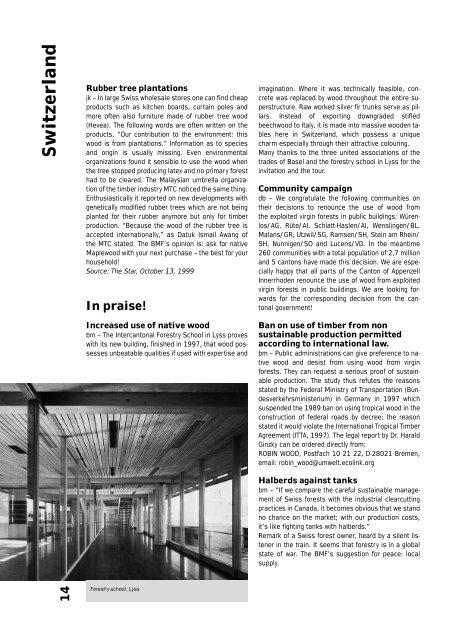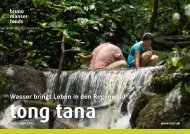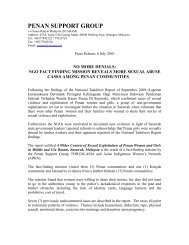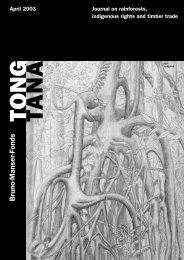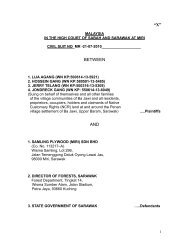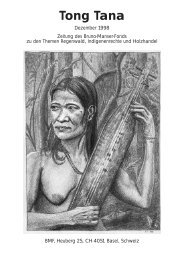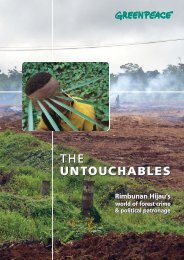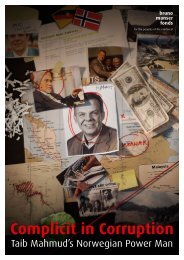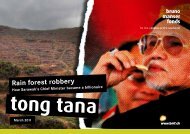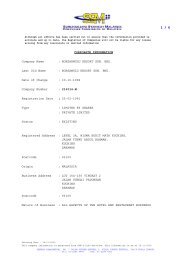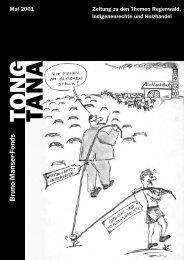Tong Tana December 1999 - Bruno Manser Fonds
Tong Tana December 1999 - Bruno Manser Fonds
Tong Tana December 1999 - Bruno Manser Fonds
Create successful ePaper yourself
Turn your PDF publications into a flip-book with our unique Google optimized e-Paper software.
Switzerland<br />
Rubber tree plantations<br />
jk – In large Swiss wholesale stores one can find cheap<br />
products such as kitchen boards, curtain poles and<br />
more often also furniture made of rubber tree wood<br />
(Hevea). The following words are often written on the<br />
products, “Our contribution to the environment: this<br />
wood is from plantations.” Information as to species<br />
and origin is usually missing. Even environmental<br />
organizations found it sensible to use the wood when<br />
the tree stopped producing latex and no primary forest<br />
had to be cleared. The Malaysian umbrella organization<br />
of the timber industry MTC noticed the same thing.<br />
Enthusiastically it reported on new developments with<br />
genetically modified rubber trees which are not being<br />
planted for their rubber anymore but only for timber<br />
production. “Because the wood of the rubber tree is<br />
accepted internationally,” as Datuk Ismail Awang of<br />
the MTC stated. The BMF’s opinion is: ask for native<br />
Maplewood with your next purchase – the best for your<br />
household!<br />
Source: The Star, October 13, <strong>1999</strong><br />
In praise!<br />
imagination. Where it was technically feasible, concrete<br />
was replaced by wood throughout the entire superstructure.<br />
Raw worked silver fir trunks serve as pillars.<br />
Instead of exporting downgraded stifled<br />
beechwood to Italy, it is made into massive wooden tables<br />
here in Switzerland, which possess a unique<br />
charm especially through their attractive colouring.<br />
Many thanks to the three united associations of the<br />
trades of Basel and the forestry school in Lyss for the<br />
invitation and the tour.<br />
Community campaign<br />
db – We congratulate the following communities on<br />
their decisions to renounce the use of wood from<br />
the exploited virgin forests in public buildings: Würenlos/AG,<br />
Rüte/AI, Schlatt-Haslen/AI, Wenslingen/BL,<br />
Malans/GR, Utzwil/SG, Ramsen/SH, Stein am Rhein/<br />
SH, Nunnigen/SO and Lucens/VD. In the meantime<br />
260 communities with a total population of 2,7 million<br />
and 5 cantons have made this decision. We are especially<br />
happy that all parts of the Canton of Appenzell<br />
Innerrhoden renounce the use of wood from exploited<br />
virgin forests in public buildings. We are looking forwards<br />
for the corresponding decision from the cantonal<br />
government!<br />
Increased use of native wood<br />
bm – The Intercantonal Forestry School in Lyss proves<br />
with its new building, finished in 1997, that wood possesses<br />
unbeatable qualities if used with expertise and<br />
Ban on use of timber from non<br />
sustainable production permitted<br />
according to international law.<br />
bm – Public administrations can give preference to native<br />
wood and desist from using wood from virgin<br />
forests. They can request a serious proof of sustainable<br />
production. The study thus refutes the reasons<br />
stated by the Federal Ministry of Transportation (Bundesverkehrsministerium)<br />
in Germany in 1997 which<br />
suspended the 1989 ban on using tropical wood in the<br />
construction of federal roads by decree; the reason<br />
stated it would violate the International Tropical Timber<br />
Agreement (ITTA, 1997). The legal report by Dr. Harald<br />
Ginzky can be ordered directly from:<br />
ROBIN WOOD, Postfach 10 21 22, D-28021 Bremen,<br />
email: robin_wood@umwelt.ecolink.org<br />
Halberds against tanks<br />
bm – “If we compare the careful sustainable management<br />
of Swiss forests with the industrial clearcutting<br />
practices in Canada, it becomes obvious that we stand<br />
no chance on the market; with our production costs,<br />
it’s like fighting tanks with halberds.”<br />
Remark of a Swiss forest owner, heard by a silent listener<br />
in the train. It seems that forestry is in a global<br />
state of war. The BMF’s suggestion for peace: local<br />
supply.<br />
14<br />
Forestry-school, Lyss


